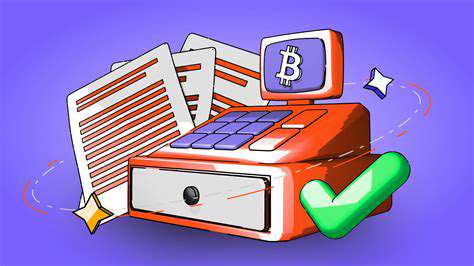How to Buy and Sell Cryptocurrency [Beginner Guide]

Setting up Your Cryptocurrency Wallet
Choosing the Right Wallet
Finding the perfect cryptocurrency wallet requires careful consideration of your specific needs. The wallet you select will directly impact both the security and accessibility of your digital assets. Various options exist, from hardware wallets offering maximum protection to software wallets providing everyday convenience. Evaluate what cryptocurrencies you plan to store (Bitcoin, Ethereum, or altcoins), your technical expertise, and desired security level before deciding. While hardware wallets boast superior security, they come at a premium price. Software wallets, available as mobile apps or desktop programs, strike a practical balance between security and usability. Always verify security features and read authentic user experiences before committing to any wallet solution.
Distinguishing between hot and cold storage proves critical for informed decision-making. Hot wallets maintain internet connectivity, facilitating quick transactions but potentially exposing assets to cyber threats. Cold wallets operate offline, significantly enhancing security while demanding more hands-on management. Your ideal choice depends entirely on your personal risk assessment and expected transaction frequency.
Setting up Your Wallet
Wallet installation procedures differ based on your selected type. Software wallets generally require downloading an application, creating login credentials, and establishing a strong password. Always verify the provider's credibility and security protocols before proceeding. The recovery phrase (or seed phrase) represents your ultimate backup - store this critical information securely and separately, as its loss could permanently lock you out of your cryptocurrency holdings.
Hardware wallets typically include specialized software and need proper device configuration. Carefully follow the manufacturer's specific setup instructions. Creating multiple secure backups of your seed phrase remains non-negotiable, protecting your investments against potential device malfunctions or physical damage.
Securing Your Wallet
Cryptocurrency security demands constant vigilance beyond initial setup. Implementing two-factor authentication (2FA) adds essential protection against unauthorized access. Remain alert for phishing schemes and avoid interacting with questionable links or downloads. Regular software updates patch vulnerabilities that hackers might exploit. Employing a reputable password manager helps generate and safeguard complex credentials, maintaining wallet integrity.
Distribute larger cryptocurrency holdings across multiple wallets to mitigate potential losses from security breaches. Your private keys and recovery phrases constitute absolute financial control - never disclose them under any circumstances. This fundamental practice forms the bedrock of cryptocurrency asset protection.
Managing Your Wallet
Effective wallet management ensures smooth cryptocurrency operations. Master your wallet's interface and functionality, including sending/receiving transactions and monitoring balances. Maintain meticulous records of all transactions, noting dates, amounts, and involved addresses for future reference and dispute resolution.
Routinely audit transaction histories for anomalies. Promptly address any suspicious activity through official support channels. Proactive management prevents complications and maintains complete control over your digital assets.
Making Your First Cryptocurrency Purchase

Setting Up Your Wallet
Selecting an appropriate cryptocurrency wallet forms the foundation of secure digital asset management. Different cryptocurrencies demand specific wallet compatibility, with options ranging from user-friendly mobile applications to sophisticated desktop solutions. Prioritize security features, intuitive interfaces, and coin support during your selection process. Comprehensive understanding of security measures prevents common mistakes and safeguards investments.
After choosing a wallet, installation typically involves downloading software, creating an account, and securing private keys. These cryptographic keys represent absolute ownership - their loss equates to irreversible asset forfeiture. Implement stringent protection measures and never share these credentials.
Understanding Cryptocurrency Transactions
Cryptocurrency transactions operate fundamentally differently than traditional banking. Instead of centralized institutions, transactions record on a public blockchain ledger. While this decentralized system ensures transparency, it requires understanding each cryptocurrency's unique transaction protocol.
Transaction fees (sometimes called gas fees) compensate network operators for processing transactions. Accurate fee comprehension prevents unexpected costs during transactions. Each blockchain platform features distinct confirmation processes - mastering these steps guarantees successful transaction completion.
Exploring Cryptocurrency Exchanges
Cryptocurrency exchanges facilitate digital asset trading, serving as marketplaces for portfolio diversification. Select exchanges with proven security histories and regulatory compliance to protect your capital. The cryptocurrency ecosystem offers centralized platforms alongside decentralized exchanges (DEXs), each presenting unique advantages and limitations.
Before trading, thoroughly analyze the exchange's fee structure and trading mechanics. Fee variations across platforms can dramatically affect investment returns. Develop proficiency with market orders, limit orders, and trading strategies to optimize performance while managing risk.
Securing Your Crypto Assets
Cryptocurrency security requires multilayered protection. Implement robust passwords, mandatory two-factor authentication, and regular software updates. Private keys and login credentials must remain absolutely confidential. Consider hardware wallets for substantial holdings, providing enhanced security through physical isolation.
Continuously monitor wallet activity for irregularities. Cybercriminals constantly develop sophisticated phishing techniques - remain vigilant against fraudulent communications. Staying informed about emerging security threats represents your best defense against digital asset theft.

Read more about How to Buy and Sell Cryptocurrency [Beginner Guide]
Hot Recommendations
- Budgeting for Travel: How to Save for Your Next Trip
- Guide to Understanding Retirement Account Rollovers
- Understanding Sector Rotation Strategy
- How to Choose Beneficiaries for Your Assets
- How to Combine Value and Growth Investing Strategies
- How to Use Stop Loss Orders When Investing
- How to Use Day Trading Strategy (High Risk)
- Understanding Investment Diversification
- How to Use a Core Satellite Investment Strategy
- Understanding Preferred Stocks


![How to Pay Off Credit Card Debt Fast [Proven Strategies]](/static/images/30/2025-05/StayMotivatedandConsistent3AKeytoLong-TermSuccess.jpg)
![Best Renters Insurance Companies [2025 Review]](/static/images/30/2025-05/CompanyB3AExcellentCustomerService26ClaimsHandling.jpg)





![Budgeting for College Students [Money Management]](/static/images/30/2025-05/UtilizingBudgetingToolsandApps3AStreamliningYourFinances.jpg)

